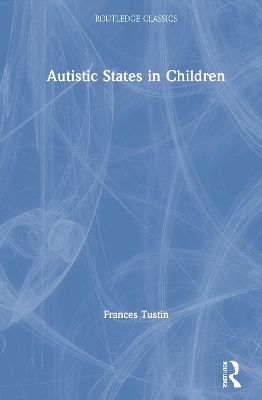
Autistic States in Children
Routledge (Verlag)
978-0-367-54735-6 (ISBN)
Frances Tustin (1913-1994) was one of the first professionally trained child psychotherapists in Britain. Although internationally recognised for her pioneering therapeutic work with autistic children, her approach is considered by some to be controversial, as her psychogenic view of childhood autism challenged the belief that it is biological and genetic.
Autistic States in Children is widely regarded as a vitally important work for understanding the causes of autism in young children. Vividly describing her clinical encounters with autistic children, Tustin argued that autistic states were above all self-protective ones. In her observational studies, she noted how autistic children's interaction with physical objects, such as keys, toy cars, or other play items, had a rigid and ritualistic quality, far removed from the typical kind of fantasy play seen in other children. Such objects are not used by autistic children for their intended purpose, Tustin argued, but rather in sensation-dominated ways that interfere with mental development. She also drew a fundamental distinction between two autistic groups: an ‘encapsulated’ group, which is withdrawn and non-verbal, and an ‘entangled’ group, who are hyperactive and chaotic but have some language.
Autistic States in Children influenced not only those in psychotherapy and psychoanalysis but countless others who have contact with autistic children, especially families, and remains essential reading for anyone seeking a creative and compelling understanding of autism.
This Routledge Classics edition includes a new Foreword by Maria Rhode.
Frances Tustin (1913-1994) was renowned for her pioneering work on the psychoanalytic treatment of childhood autism. In 1952, Tustin joined the second intake of the new child psychotherapy training program at the Tavistock Clinic in London. Her interest in autism began in 1954 when she spent a year at the James Jackson Putnam Center in Boston, Massachusetts. She worked there both as a therapist and as a general assistant in managing autistic children. On returning to Britain the following year she established a close working relationship with Mildred Creak, a child psychiatrist at Great Ormond Street Hospital in London, and later developed a private practice in which she specialised in treating the most disturbed children. From 1971 to 1973 she was principal child psychotherapist at the Tavistock Child Guidance Centre. The author of several books and influential papers, she taught extensively both abroad and in Britain, and her books have been widely translated. She was an Honorary Member of the Association of Child Psychotherapists and an Honorary Affiliate of the British Psychoanalytical Society. Several months after her death Tustin’s husband, and the psychoanalysts Judith and Theodore Mitrani, founded the Frances Tustin Memorial Trust in Los Angeles (now based in Paris). The Trust awards an annual Frances Tustin Memorial Prize and lectureship for a clinical paper on, 'the treatment of primitive mental states in general and autistic states, in particular, in children, adolescents or adults.' Tustin’s archive is held at the Wellcome Library.
Foreword to the Routledge Classics edition Maria Rhode Introduction 1. Observational studies of autistic children: the sort of children this book is about 2. Revised understandings of the aetiology of psychogenic autism Part 1: Childhood psychosis 3. Theoretical aspects of childhood psychosis 4. Auto-sensuous aspects of childhood psychosis 5. Autogenerated encapsulation 6. Confusional entanglement 7. Auto-sensousness as a basis for classification of childhood psychosis Part 2: Psychodynamics and treatment of autistic states 8. The pathological operation of auto-sensuouness 9. Psychological birth and psychological catastrophe 10. Autistic objects 11. Confusional objects 12. The asymbolic nature of auto-sensuous states 13. Awareness in autistic states 14. Psychotherapy with autistic states in children 15. Transference phenomena in autistic states Part 3: Clinical studies 16. Sam 17. 'Thinkings' 18. The struggles of an autistic child to develop a mind of his own 19. Autistic elements in neurotic disorders of childhood Concluding Remarks. Afterword References Name Index Subject Index
| Erscheinungsdatum | 31.03.2021 |
|---|---|
| Reihe/Serie | Routledge Classics |
| Verlagsort | London |
| Sprache | englisch |
| Maße | 156 x 234 mm |
| Gewicht | 571 g |
| Themenwelt | Geisteswissenschaften ► Psychologie ► Psychoanalyse / Tiefenpsychologie |
| Medizin / Pharmazie ► Medizinische Fachgebiete ► Psychiatrie / Psychotherapie | |
| ISBN-10 | 0-367-54735-X / 036754735X |
| ISBN-13 | 978-0-367-54735-6 / 9780367547356 |
| Zustand | Neuware |
| Informationen gemäß Produktsicherheitsverordnung (GPSR) | |
| Haben Sie eine Frage zum Produkt? |
aus dem Bereich


